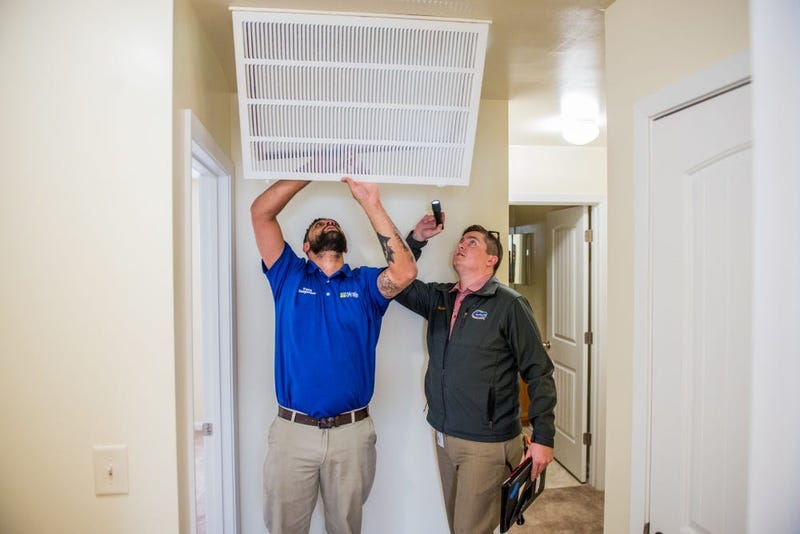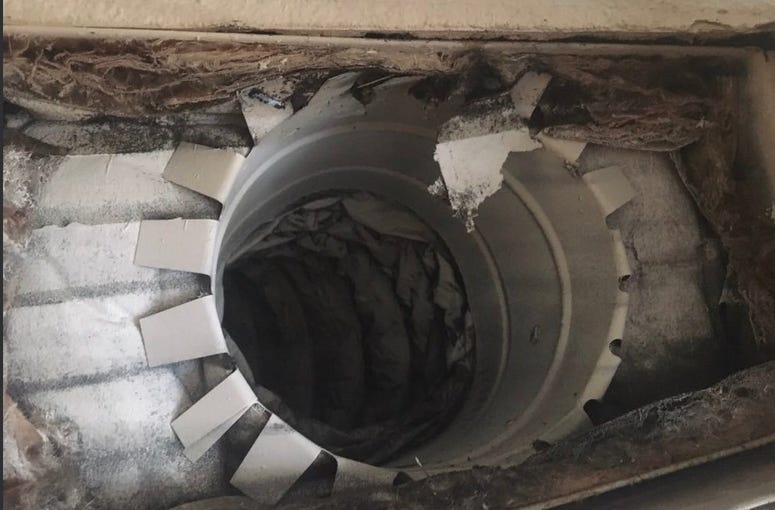
Rachel Christian moved into on-post housing at Ft. Polk, Louisiana, in September of 2015 when she was pregnant with her first son. Occasionally she would have maintenance issues like leaks and black mold. When she called the outsourced maintenance company to repair the problem, the workers would brush off her concerns.
“Maintenance would say, 'welcome to Louisiana', as a joke,” Christian told Connecting Vets. For her two children, born while she lived there, it wasn't anything to laugh about.
"Since the day we took him home there was something that never seemed right," she said of her firstborn son, "And as he got a little older he was not verbalizing correctly, he was constantly sick, always vomiting, always losing weight."
It turned out that there were dangerously high levels of lead in the water in her home, which was also reflected in her son's blood tests.
In the meantime, her second child was having issues with chronic constipation, a symptom of lead poisoning. She also found mold growing in her home, an issue that in her opinion, was never adequately resolved.
She eventually moved out of her home, but in some regards, it was too late.
“Your child is forever changed,” Christian said.
Her firstborn child was diagnosed with autism, which some believe is linked to high levels and now receives 40 hours of therapy a week.

Christian is one of many military families who lived in on-post housing whose life has been affected by poor health conditions.
In an attempt to rectify these and other issues the military recently signed and published a tenants bill of rights. The bill of rights serves as guidance but is not an enforceable law.
"We are focused on investment and reinvestment strategies to ensure long-term viability and quality of housing," said Gen. Gus Perna who is in charge of Army Material Command and has been assigned to deal with the problems arising from privatized on-post housing.
But Connecting Vets has learned many of the promises made my military officials may be for naught unless the leases between military installations and the commercial companies who run on-post housing are rewritten.
In order to get a better understanding of the housing situation on Ft. Polk from a legal perspective, Connecting Vets obtained the ground lease between Ft. Polk and Polk Communities LLC. Polk Communities LLC is a company under the umbrella of Corvias Property Management, which is responsible for on-post housing on 13 military bases.
When it comes to black mold the contract states Corvias cannot ignore the issue. Corvias, "will be in compliance with applicable laws and regulations relating to mold; and that the Secretary assumes no liability for future remediation of mold or damages for personal liability, illness, disability or death, to the Lessee, its successors or assigns, or to any other person, including members of the general public, arising from or incident to exposure to or any other activity causing or leading to contact of any kind whatsoever with mold on the improvements after the Effective Date."
"The contract is written in such a fashion that they are remarkably protective of the companies and remarkably unprotective of the families," attorney Jim Moriarty told Connecting Vets. Moriarty is a lawyer who has previous experience dealing with corporate litigation and has spent a significant amount of time examining the privatization of military housing.
Despite what Moriarty had to say, in a recent interview Gen. Pernas did not seem dissuaded with the mission he has been tasked with.
"I feel incredibly empowered...the secretary and the chief have given me this authority," he said.
However, the Ft. Polk ground lease makes it clear that he is not empowered to make any inspections and cannot even visit on-post housing without forewarning and without someone from Polk Communities LLC accompanying him.
According to Reuters, Corvias CEO John Picerne has secured dozens of lucrative contracts over the past two decades to build and maintain on-post housing, many of which are now plagued by black mold and other hazards affecting military families.
The lease agreement goes on to explain that if either party fails to comply it would constitute a default of the ground lease which could then move to termination of the contract. This clause could potentially help the military and military families seek accountability for the many housing issues that they are dealing with several lawyers told Connecting Vets after reviewing the document.
While black mold and lead poisoning continues to plague military housing units across the country, many families have been placed in hotels while they wait for the situation to be resolved.
“I want base commanders to take it more seriously; you got lead on the installation. It's not a joke," Christian said.
"I see family after family after family of special needs kids. There is a pattern," Moriarty informed Connecting Vets. "By the harm that is being done to them with lead paint, mold exposure that they continuously lie about. That's anecdotal and it will be 4-5 years before anyone can prove it but I see special needs kids right and left and it doesn't make sense."
Connecting Vets reached out to Corvias Property Management for comment but had not heard back at the time of publication.
